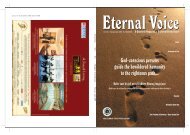The Life & PhilosophyofGuru NanakBy K.T. S. Tulsiuru Nanak, the founder of Sikh Religion, and the first in theGsuccession of ten Gurus, was the soul of a powerfulcurrent of spiritual and social renewal. The birth of Nanak in1469 was spoken of, by the village priest, as very auspicious.The priest prophesied that he would not only be an adorer ofGod but lead many others to Him.ChildhoodA precocious child, Nanak, at the age of five, started askingquestions about the purpose of life. When sent to a Pandit tolearn alphabet, he surprised his teacher by composing a poemof mystic import. While his parents and sister were excitedabout his brilliance, they became worried by his lack ofattention to worldly tasks. He let the cattle, entrusted to him towander into a farmer's field and distributed money, that wasgiven for business to the needy. When his father summoned aphysician to examine Nanak, the physician declared that he hadno need of healing and that he was destined to heal many.Nanak, thereafter, went to live with his married sister, whoprocured him the job of a storekeeper in Sultanpur. While heperformed his duties diligently and won the admiration of all,it was here that he began to gather a group of disciples and withthem took to singing of hymns. He shared common meals withthem and urged his friends to lead a life of simplicity andrighteousness.Encounter with DivineOne day Nanak failed to appear for work after he had gone tothe nearby river Bein, for morning ablutions. He was missing forthree days and nights and was feared drowned. But instead, hewas in intimate communion with the Divine, during which hereceived a call for going into the wider world. The mysticalexperience is described as a direct encounter with the Divine.The first words uttered by Guru Nanak on his reappearancewere, 'There is no Hindu, no Musalman.' He announced to theworld that there is one God, who is beyond the religiousdivisions created by humankind. He was now 30 years of age,already married to Sulakkhani and was father of two sons.Leaving his family behind and taking Mardana as his solecompanion, he left Sultanpur for 20 years. Guru Nanakembarked upon four long journeys - to the East, South, Northand West. At the end of each journey, he returned to Punjab. Hewent to several important places of pilgrimage - Kurukshetra,Mathura, Haridwar, Banaras, Gaya as well as those in Bengal,Assam and Ceylon. He visited Sufi establishments in Pak Pattonand Multan. He traveled beyond India to Mecca, Madina andBaghdad in the West and Tibet and China in the East. He is alsobelieved to have traveled to Mount Sumero. During his travels,he held dialogues with Pandits, Sadhus, Yogis, Peers and Qajis notas an uncommitted seeker but as a teacher. While he challengedmany religious teachers of his time, he never challenged anyreligion. He proclaimed a new vision of one God, whose powergoes beyond names and forms. He won over his opponents notby magical power or intellectual acumen, but by moralpersuasion and the power of loving devotion. He was not asectarian reformer but a preacher of diving reality transcendingall particularities of race and clan.Guru Nanak's years of traveling ended around 1521, which alsocoincided with the establishment of Kartarpur. This was thetime of consolidation, in which religious verse was reduced towriting and patterns of worship of the community established.Morning prayers commenced before sun-up with the singing ofhymns. These were followed by a day full of work and endedwith hymns and prayers each evening. Guru Nanak did notestablish a vast organization but instead developed a simple,spiritual and moral discipline that had the capacity ofreproducing itself. It is here that the Guru's own word waspreserved in Guru Granth Sahib, running through the entire bodyof verse is one clear note of witness to the will and being ofGod. From this commitment arose the unbounded love, hisdeep compassion and active concerns for the welfare of man.His compositions are dedicated musings of the Creator and Hisattributes. In all this, he speaks as a witness to revelation:jYsI mY AwvY Ksm kI bwxI qYsVw krI igAwnu vy lwlo ] (722)J-ei-see m-ei aav-ei Khasam kee baan(h)ee T-ei-sar(h)aa karee giaan(u) v-ai Lalo.(As the Lord sendsh His word so do I deliver it.)alsohau Awphu boil n jwxdw mY kihAw sBu hukmwau jIau ] (763)Hao(u) aapah(u) bol(i) na jaan(h)daa M-ei kahiaa sabh(u) hukamaao(u) jeeo(u).(By myself, I do not even know how to speak; I speak all that theLord commands.)Guru Nanak's VersesIt becomes clear that Guru Nanak believed himself to beperforming a divinely appointed commission. All of GuruNanak's preaching is set forth in verse. No other way wouldhave been adequate to the range and depth of his moods, hisfervent longing for the Infinite, his joy and wonder at the beautyand vastness of His creation, his tender love for his fellow-menand his moral speculation and concern for the people. Hiscompositions reveal an abounding imagination and a subtleaesthetic sensitivity. His hymns are composed in commonlanguage - Punjabi, which was for the first time used extensivelyThe priest prophesied that hewould not only be an adorer ofGod but lead many others to Him.<strong>Eternal</strong> <strong>Voice</strong> Nov, 2010 - Jan, 20114 5
To the Vaishnavite and the Shaivite, theTantrist and the Penitent, the Sanyasiand the Dervish, the Bhakta and theSufi, the Pandit and the Mulla, the Jainand the Siddha, Guru Nanak spoke inthe same vein.and consistently, for literary expression. Guru Nanak's languageis delicate and innovative. The core of his vocabulary is thespeech of the common man of his days in Punjab. To thislanguage, he brings fresh element of his power of vivid imageryand from his vigorous observation and extensive experience oftravel and contact with a variety of people. He freely drawsupon the terminology of the Upanishads and of Yogis, Sadhusand Sufis.The characteristic quality of his poetry is the eloquence of itssymbolism and the down to earth sinewy presence of Punjabivocabulary, the ceremonies, observed by various faiths,conjugal lives, haunting music, dancing, games, rope dancers,acrobats and mimics. The following example of his imagerydrawn from framing enunciates how truth might be reaped:mnu hwlI ikrswxI krxI srmu pwxI qnu Kyqu ]nwmu bIju sMqoKu suhwgw rKu grIbI vysu ]Bwau krm kir jMmsI sy Gr BwgT dyKu ] (595)Mann(u) haalee kirsaan(h)ee karan(h)ee Saram(u) paan(h)ee tann(u) kh-ai-t(u)Naam(u) beej(u) santokh(u) suhaagaa Rakh(u) gareebee v-ai-s(u)Bhaao(u) karam kar(i) jammsee S-ai ghar bhaagath d-ai-kh(u).(Make body the field, the mind of ploughman, honest labor theirrigating water, sow the seed of Lord's name, let contentment be theleveler, and humility the fence, with deeds of love, the seed willfertilize.)The underlying singleness of theme could have led to inevitablerepetition but it has been rescued from plain uniformity by thevariety of his own imagery as well as range of its metre. GuruNanak resorts to no prosaic moralizing. The variety andvariation in the moods of his poetry range from mystical andlyrical to philosophical and critical; and from devotional andcontemplative to aesthetic and sensuous. But he is happiest,singing the infiniteness of God. His yearning for Him is oftenrendered in the allegory of conjugal love and His description ofnature has provided the Punjabi language with some of itsliterary masterpieces. Guru Granth Sahib is a testament aboutGod's existence and is a sterling statement of Guru Nanak'svision of Him.TeachingAnother influential factor of his poetry is the music, of which hemade extensive use. But above all was the attraction of his ownperson. He lived amongst men with graciousness and humility.Few could resist his intensely human and sympathetic manner.He had a charming and spontaneous way with the crowd, withwhom he mixed freely and won his audiences instantly. Histeaching was indirect and incidental. His words wereself-effacing. But it was his deeply absorbing personality thattouched the hearts of many.Idolatry, Superstitions, Magic & MantrasGuru Nanak strongly disapproved of idolatry, polytheism andthe attendant ritualism. There is a powerful treasure of hymnswhere Guru Nanak proclaims:piV pusqk sMiDAw bwdM ] isl pUjis bgul smwDM ]muiK JUT ibBUKx swrM ] qRYpwl iqhwl ibcwrM ]gil mwlw iqlku illwtM ] duie DoqI bsqR kpwtM ]jy jwxis bRhmM krmM ] siB Pokt inscau krmM ]khu nwnk inhcau iDAwvY ] ivxu siqgur vwt n pwvY ] (470)Parh(i) pustak sandhiaa baad(ang) Sil poojas(i) bagul samaad(ang)Mukh(i) jhooth bibhookhan(h) saar(ang) Tr-ei-paal tihaal bichaar(ang)Gal(i) mala tilak(u) lilaat(ang) Due(i) dhotee bastar(n) kapaat(ang)J-ai jaan(h)as brahm(n) karam(ang) Sabh(i) phokatt nischao(u) karam(ang)Kah(u) Nanak nihchao(u) dhiaav-ei Vinn(h) Satgur vaat na paav-ei.(Truth is not achieved by mere performance of prescribed acts -bathing in sacred pools will not help if one has not shed one's ego,nor will the sacred mark on the brow or the Janeu profit. Useless isworship without faith restrains without truth and the sacred threadwithout self-control. You may wash and bathe and run the mark ofyour caste across your forehead yet purity will not be attainedwithout pure conduct)To the Musalman, he said: “It is not easy to be called aMusalman………. when he has established his goodwill for all,O' Nanak, will he be called a Musalman”To the Yogi, he said: "Religion lies not in the patched garmentnor in his scarf nor in his besmearing the body with ashes.Religion lies not in suspending large rings from split ears, nor inshaving the heads nor in the blowing of horns To liveuncontaminated amid worldly temptations is to find the secretof religion………. He who regards all men as equal is trulyreligious. Religion lies not in wandering outside to tombs andplaces of cremation nor in posture of contemplation; Religionlies not in roaming abroad nor in bathing at places ofpilgrimage."To the Vaishnavite and the Shaivite, the Tantrist and the Penitent,the Sanyasi and the Dervish, the Bhakta and the Sufi, the Panditand the Mulla, the Jain and the Siddha, Guru Nanak spoke in thesame vein.His purpose was not to criticize any sect or order, but to call theattention of the people to the persistent fallacies whichdistorted the essential integrity of humanity. He asked all ofthem to go beyond rituals and to recover the basis andmotivation for truth and moral action.He pronounced time and again that:glI iBsiq n jweIAY CutY scu kmwie ] (141)Gallee(n) bhist(i) na jaaee-ei Chhutt-ei sach(u) kaamaae.(No-one ever reached paradise by subscribing to mere forms; onesecured release only by practicing the truth.)Guru Nanak stressed the futility of charms, spells and manysuperstitious observances prevalent at that time. He wasconcerned about the true value of faith and purity of religiouspractice. He wanted to free people's mind from the pervadingsense of fear and oppression by authority - political as well asecclesiastical - and social inequality. He wished that people willoutgrow their inertia and credulousness and recognize theharmful effects of mental enslavement. He wanted them to ridthemselves of the influence of Sadhus. “Show no reverence tothose who call themselves Gurus and Peers but go aboutbegging for alms. Those, who live by their own labor and sharethe fruit with others, have found the right path”, Nanak said.Guru Nanak denounced belief in magic and mantras andirrational notions of defilement by touch and impurity that wasbelieved to attach to occasions as child birth.:jy kir sUqku mMnIAY sB qY sUqku hoie ]gohy AqY lkVI AMdir kIVw hoie ]jyqy dwxy AMn ky jIAw bwJu n koie ] (472)J-ai kar(i) sootak(u) mannee-ei Sabh t-ei sootak(u) hoeGoh-ai at-ei lakkar(h)ee Andar(i) keer(h)aa hoeJ-ai-t-ai daan(h)-ai ann k-ai Jeea baajh na koe.(If you believe in pollution at birth, there is pollution everywhere.There are creatures in cow-dung considered sacred by Hindus, andin wood. There is life in each gain of corn.)Ahead of his timesGuru Nanak was distinctly in advance of his times. His isperhaps the first recorded version of the Universe consisting ofmillions of planets, paying their obeisance to Sun in the form ofAarti:lK Awgwsw Awgws ] (5)Lakh aagaasaa aagaas.(There are hundreds of thousands of heavenly worlds above.)To Guru Nanak, death was by God's will and was not to bedreaded:mrxu muxsw sUirAw hku hY jo hoie mrin prvwxo ] (579)Maranh(u) mun(h)saa sooriaa hakk(u) h-ei Jo hoe maran(i) parvaan(h)o.(Death was the privilege of the brave.)Such language was unique in an age dominated by timidity.Guru Nanak set in motion a current of practical reforms.“All men are equal”, he declared to prove his point. Heestablished Guru Ka Langar, emphasizing in the tradition ofcommon meal, the concept of true fellowship and equality.During his teaching, men and women were admitted withoutdistinction of caste and creed.Guru Nanak was acutely conscious of the position of inferiorityassigned to women. He made many bold pronouncements tohis followers to give them full equality with men. In one of hisverses, he said:BMif jMmIAY BMif inMmIAY BMif mMgxu vIAwhu ]BMfhu hovY dosqI BMfhu clY rwhu ]BMfu muAw BMfu BwlIAY BMif hovY bMDwnu ]so ikau mMdw AwKIAY ijqu jMmih rwjwn ]BMfhu hI BMfu aUpjY BMfY bwJu n koie ]nwnk BMfY bwhrw eyko scw soie ]ijqu muiK sdw swlwhIAY Bwgw rqI cwir ]nwnk qy muK aUjly iqqu scY drbwir ] (473)Bhandd(i) jammee-ei bhandd(i) nimmee-ei Bhandd(i) mangan(h) veeaah(u)Bhandah(u) hov-ei dostee Bhandah(u) chall-ei raah(u)Bhandd(u) mooaa bhandd(u) bhaalee-ei Bhandd(i) hov-ei bandhaan(u)So kio(u) mandaa aakhee-ei Jitt(u) jammeh(i) RaajaanBhanddah(u) hee bhandd(u) upj-ei Bhandd-ei baajh(u) na koeNanak bhandd-ei baaharaa Ai-ko sachaa soeJitt(u) mukh(i) sadaa saalaahee-ei Bhaagaa rattee chaar(i)Nanak t-ai mukh oojal-ai Titt(u) sach-ei darbaar(i).<strong>Eternal</strong> <strong>Voice</strong> Nov, 2010 - Jan, 20116 7





